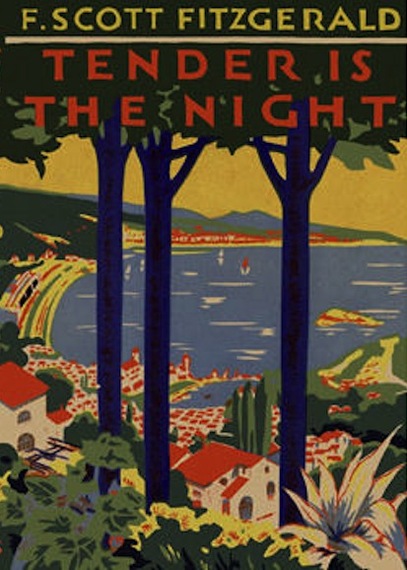What will you read at the beach this summer? For me, the best beach book ever written is F. Scott Fitzgerald's last completed novel, Tender Is The Night (1934).
You needn't be by the sea to read it, of course, for you can see and smell and almost taste the Mediterranean, wherever you are, thanks to Fitzgerald's magical words:
"On the pleasant shore of the French Riviera, about half way between Marseilles and the Italian border, stands a large, proud, rose- colored hotel. Deferential palms cool its flushed façade, and before it stretches a short dazzling beach. Lately it has become a summer resort of notable and fashionable people; a decade ago it was almost deserted after its English clientele went north in April. Now, many bungalows cluster near it, but when this story begins only the cupolas of a dozen old villas rotted like water lilies among the massed pines between Gausse's Hôtel des Étrangers and Cannes, five miles away."
Tangles of seaweed lie on that "short dazzling beach" with a tangle of expatriates who are Tender's main characters. Among them are a man writing his version of Ulysses, with a "decayed old French aristocrat" pitted against Modernism; a beautiful sunburned woman in pearls, with "thick, dark, gold hair like a chow's," trying to recover from her unspeakable abuse by her father years before; and a handsome "leonine" man who looks great in a bathing suit (one of Fitzgerald's many characters based in part on himself), the young doctor Richard Diver. Dick dazzles vacationing teenage movie star Rosemary Hoyt from their first meeting by the sea: "for a moment she lived in the bright blue worlds of his eyes, eagerly and confidently."
Daytime is the most vivid, and dangerous, time of day on the Riviera's beaches in Tender. Pale Americans burn, in every sense of the word. Their shoulders turn red and peel; their hearts and lusts are engaged and disengaged; afternoon affairs come to pass between people who must be at different homes at night; tempers flare with the temperatures. "Noon dominated sea and sky -- even the white line of Cannes, five miles off, had faded to a mirage of what was fresh and cool; a robin-breasted sailing boat pulled in behind it a strand from the outer, darker sea. It seemed that there was no life anywhere in all this expanse of coast except under the filtered sunlight of those umbrellas, where something went on amid the color and the murmur."
Evenings are less brightly ablaze, but no less intense. In the late afternoon, the sea is varied and seducing, "as mysteriously colored as the agates and cornelians of childhood, green as green milk, blue as laundry water, wine dark." Music filters in "through the ghostly moonshine of a mosquito net," people slide into bedrooms where they don't - or do - belong, eyes are "bloodshot from sun and wine," duels are fought to a nightingale's tune.
Adultery, that constant possibility particularly available to the traveling, the hotel-dwelling, the wealthy at ease, the married but bored, fuels and haunts Tender. It's not much fun, either: "He kissed her without enjoying it. He knew that there was passion there, but there was no shadow of it in her eyes or on her mouth; there was a faint spray of champagne on her breath." Rosemary, fittingly for a young actress from Hollywood's dream factory, falls in love with images, the tan, beautiful couple she has seen so lightly clothed on that lovely little beach - Dick and Nicole Diver, who sign their notes "Dicole."
"She smiled up at him; her hands playing conventionally with the lapels of his coat. 'I'm in love with you and Nicole. Actually that's my secret -- I can't even talk about you to anybody because I don't want any more people to know how wonderful you are. Honestly -- I love you and Nicole -- I do.'
-- So many times he had heard this -- even the formula was the same."
The novel flashes back from the present - 1925 - to 1917 and the aftermath of World War I. The war is buried in plain view all around the story, in a way Fitzgerald only gestures to in The Great Gatsby (1925). We see Dick as an army captain and practicing doctor, and Nicole as a broken but brilliant patient, a teenager then as Rosemary is now. There are train rides on which loves and lives are made, and wrecked. It is an ill omen indeed when the proprietor of one's hotel is named Mr. McBeth. Paris is a beautiful and damned playground; the Alps are even worse. The seaside is what feeds the characters all, and where they need to be, particularly Dick, even in November, when "the waves grew black and dashed over the sea wall onto the shore road[.]"
As the conclusion comes, the passage of five years has rubbed out the brilliance of much, and many. Even the Riviera's palette has paled: "A white sun, chivied of outline by a white sky, boomed over a windless day." Fitzgerald finished Tender when he was thirty-seven, and seven years later he was dead. He never completed another novel.
Fitzgerald took his title from a John Keats poem he loved, Ode to A Nightingale (1819). On a shard of paper, sometime in the 1930s, he wrote his own brief verse that shatters you:
Don't you worry I surrender
Days are long and life's a bender
Still I know that
Tender Is The Night
Surrender to Tender. If you love Gatsby, as I do, be warned that you will love Tender even more. Of Fitzgerald's novels, Gatsby has my heart, but Tender breaks that heart, every time. And, even knowing this, I read it again.
Anne Margaret Daniel
Hear Fitzgerald reading from Ode to a Nightingale here.
All quotations from the novel are from F. Scott Fitzgerald, Tender Is The Night (1934), copyright Scribners/Simon & Schuster.


